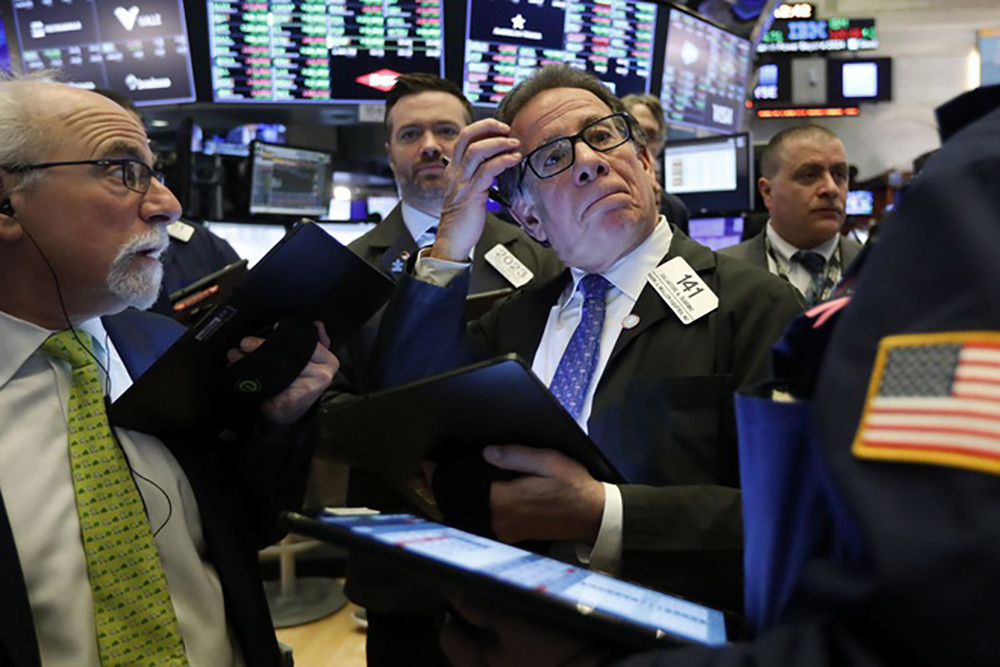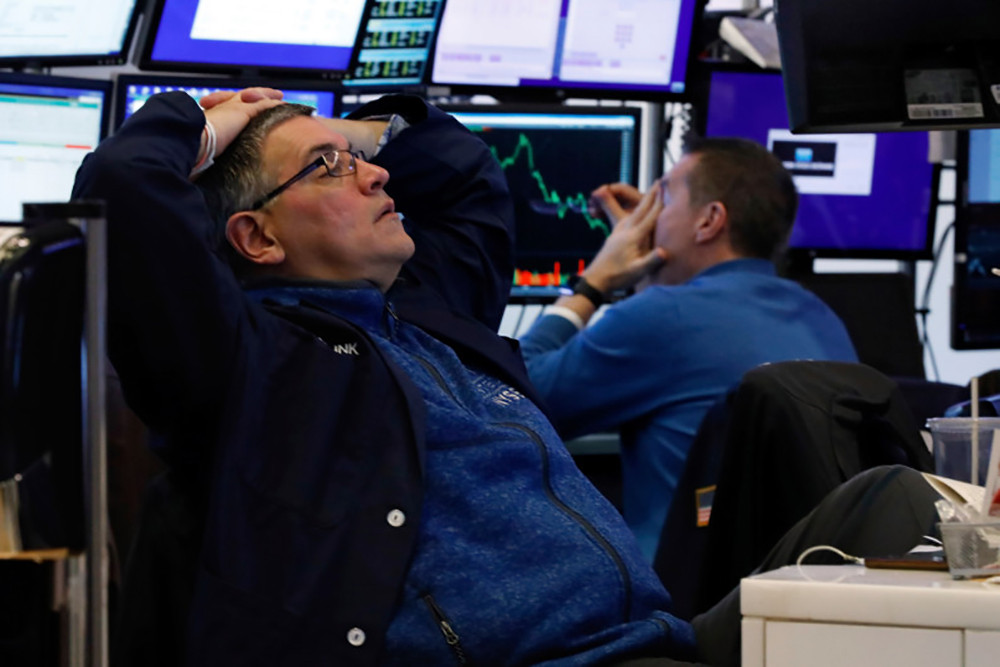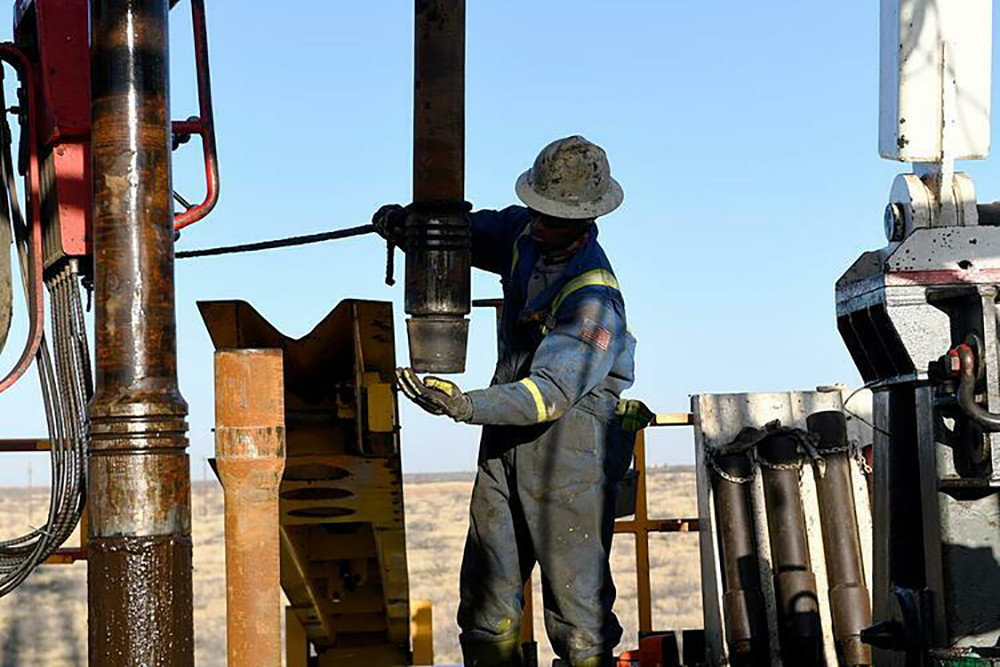World last week: Covid-19 dealt a heavy blow to the world economy
(Baonghean) - The global stock market has witnessed its sharpest decline in decades with a series of sell-off reactions right after President Donald Trump suspended flights between the US and Europe for 30 days. And the decision of the head of the US also shook the world oil price market, which is under a lot of pressure from the tension of the oil price war between Russia and Saudi Arabia. These are the notable international issues of the past week.
Black Thursday
Global stock markets plunged on March 12, the “darkest Thursday” in history since “Black Monday” in October 1987. Some markets fell the most in decades. Measures taken by central banks failed to calm panic over the outbreak of the Covid-19 pandemic. The London Stock Exchange (UK) lost 10.87%, the biggest drop since 1987. Stock prices in France and Germany fell sharply by 12%, in Spain by -14%, and in Italy - the epicenter of the Covid-19 epidemic in Europe, fell nearly 17%.
 |
| World stock markets were in the red on March 12 after the US President's travel ban from Europe. Photo: Chicago Sun Times |
The market volatility was “triggered”, causing a sell-off reaction explained by the decision of US President Donald Trump to suspend flights between the US and Europe for 1 month. Along with that, the European Central Bank decided not to lower interest rates, although it announced an economic stimulus package to deal with the Covid-19 pandemic.
“I don’t want to say panic, but it’s really unclear how things will play out. The United States has always been a defender of free markets and free trade. If people stop traveling, that’s not a positive sign. Now we’ve seen the Covid-19 crisis start to hit the economy.”
On Wall Street, major indexes such as the Dow Jones and S&P all fell sharply when they opened. The S&P 500 fell sharply by 9.5%, with a total decrease of 26.7% compared to the high set last month. At the end of the session, the Dow Jones index fell by 10%, the biggest drop since "Black Monday" 33 years ago. Stock trading sessions fell so fast that the US triggered an automatic trading halt order within 15 minutes for the second time this week to stop the decline. In that context, the US Central Bank had to pour trillions of dollars into the bond market in a strong effort to prevent a repeat of the credit crisis of 2008.
In the Asian market, Japan's Nikkei 225 index fell to a more than 3-year low, and South Korea's Kospi index also slowed down to 4.8%. Bitcoin recorded a 25% slide in the strong volatility of the cryptocurrency market. Meanwhile, the spread of Covid-19 has reduced people's travel demand, especially affecting the aviation industry in the past few weeks. On March 12, the Civil Aviation Administration of China said that the country's airlines reported a total loss of 20.96 billion yuan (about 3 billion USD) in February. The number of air passengers in the past month has decreased by 84.5% compared to the same period last year.
 |
| Stock exchange employees were stunned as they witnessed the decline of the New York stock market. Photo: Reuters |
Analysts say President Donald Trump's new order banning all travel from European countries to the US for one month will put more pressure on the aviation industry, which has been affected by the Covid-19 pandemic. In particular, this decision will deal a heavy blow to foreign airlines such as Germany's Lufthansa and France's Air France KLM, which dominate the passenger market between Europe and the US. In addition, experts predict that the US government's move risks causing chaos at dozens of airports across Europe as passengers try to catch the last flight to the US before the ban takes effect. "The travel ban to Europe is a decision that investors did not expect. It will be a real financial blow to the tourism industry, which has been affected by the pandemic," said Tim Anderson, investment fund Tjm.
The oil price war escalates
The intense tension between Russia and Saudi Arabia over oil prices; the reduced demand for jet fuel, gasoline and diesel due to the impact of the travel ban amid the Covid-19 pandemic... has caused the world oil market to face a nightmare scenario.
US crude oil prices fell another 6% to $31 a barrel after President Donald Trump announced travel restrictions with Europe. Global crude oil prices fell to a low of $30.02 a barrel, down 27% this week. Goldman Sachs has cut its forecast for global crude oil prices in the second and third quarters of this year to $30 a barrel and warned that prices could fall to $20 a barrel in the coming weeks. Meanwhile, investors around the world are fleeing risky investments, including stocks. A sign of the Great Recession.
 |
| Workers at an oil facility in Texas (USA). Photo: Reuters |
The biggest problem facing the oil market today is the collapse in demand for jet fuel. Thousands of flights have been canceled and are likely to be disrupted further due to restrictions and concerns about travel. Observers say travel bans are only adding to the fear and destroying demand for energy products. Rystad Energy estimates that a 30-day travel ban from Europe will result in a loss of 600,000 barrels per month in jet fuel demand. The fallout from the travel ban is also weighing on investor confidence.
“This has led to further loss of confidence in the government's handling of the crisis, and increased uncertainty about the extent of the pandemic's impact on the economy as a whole.”
The collapse in oil prices has devastated energy companies large and small. If oil prices continue to fall as they have, most shale and oil sands production will become uneconomical. Many producers, especially small and medium-sized ones, will be hurt because hydraulic fracturing—the process of drilling deep into the ground to extract oil and gas from shale deposits—is capital-intensive.
In such a context, the oil price war between Russia and Saudi Arabia, by keeping oil prices low, will also further destabilize the oil market. Although both will temporarily eliminate many competitors and position themselves as the biggest beneficiaries when oil prices rise again, both Russia and Saudi Arabia are also hurting themselves.
 |
| Oil prices are expected to continue to fall sharply next week. Photo: CNN |
Dr. Garbis Iradiang, head of the Middle East and North Africa region at the Washington-based Institute of International Finance, analyzed: Oil exports account for about half of Saudi Arabia's gross domestic product and 70% of export revenue. Saudi Arabia's budget deficit in 2020 was based on a price of $58 per barrel. With oil prices now falling more than before, Riyadh will have to increase the deficit, withdrawing more than $500 billion in foreign currency reserves.
On the Russian side, although its economy is more diversified than Saudi Arabia, Moscow could still lose market share to its rival if Riyadh sharply reduces prices to Western Europe, which is Russia’s main oil and gas export market. In addition, with lower oil prices, Russia would lose revenue from oil exports. However, since oil revenues account for less than half of its total budget revenues, Moscow could balance its budget at $42 a barrel.




.jpg)
![[Infographics] 5 biện pháp phòng, chống dịch COVID-19 [Infographics] 5 biện pháp phòng, chống dịch COVID-19](https://bna.1cdn.vn/thumbs/540x360/2025/05/22/anh-2.jpg)

-5b8619d675cc4f38cedd8c853332ddab.jpg)
